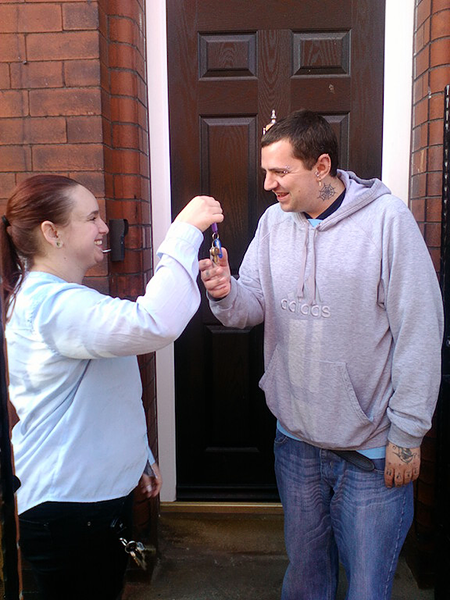It has been reported that often there is insufficient attention to the mental health and mental illness of people with autism.
The reality is that anxiety, depression, obsessive-compulsive disorder and phobias can affect any one of us, regardless of being on the spectrum.

Dream come true: Andrew collects the keys for his own apartment
The National Autistic Society state that research indicates 70 per cent of children with autism develop mental health problems. Meanwhile, 16-35 per cent of autistic adults have a co-morbid psychiatric disorder.
Unique mental health support
Not only have we been aware of the need to care for mental health, quite uniquely we appointed a clinical and residential support worker to lead on the mental health and welfare of service users and staff within Goldcrest House.
Working with a consultant educational psychologist, we consult with our service users to develop strategies that support their physical and mental needs and development towards normalisation and inclusion.
Mental hygiene is very important and through our on-going assessments we are able to develop behaviour strategies and support plans to minimise the likelihood of high levels of clinical care.
We are able to monitor and pick up on the issues that can become worse if not addressed amongst those in society that find it incredibly difficult to articulate how they feel.
Person-centred plan
Part of this process is to consider likes, dislikes, ambitions, talent, and skills through consultation and observation. This allows for the development of a person-centred plan that nurtures and encourages personal development without overwhelming the individual.
Much of our structured work focuses on learning, physical exercise, community interaction, and meaningful work experience or employment. It’s about small steps and gradual progression; no one is forced into a situation where they don’t feel comfortable.
Each individual is supported by a bespoke programme of development. It ranges from addressing their right to vote or work, to learning and gaining a qualification. It also involves developing life skills such as managing money or going shopping, or physical health through exercise. We cater for every need.
One service user’s bucket list number one was to achieve his life-long dream of living independently with autism. He now lives independently in his own apartment whilst receiving day support from our care staff.
‘Freedom to live my own life’
When asked what independent living meant to him, Andrew replied: “It has given me the opportunity to live in my own apartment, and the freedom to live my own life with the security of knowing that staff are there for support should I need it.
“Independent living has proved to me and my family and friends that I can be trusted. I have learnt new skills; I pay the rent and electric and cook my meals – my best and favourite meal is curry, it’s my speciality.”
Part of our work was to remove the self-doubt this individual had. We developed a care plan that would prepare and develop him so he could achieve his dream – and it worked.
We know it works: the improvements to our service users’ mental health have been transformational. In fact, it has worked so well we are in a position to start the transition of two more of our service users moving into their own supported living accommodation. And we will not stop there…
To discover more about Goldcrest House, click here
















